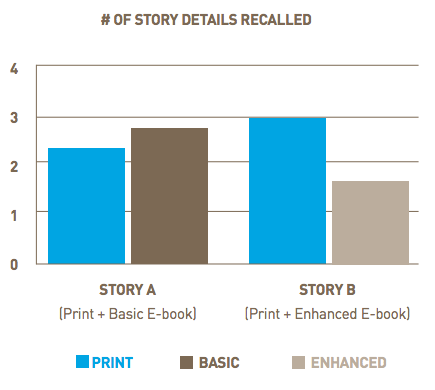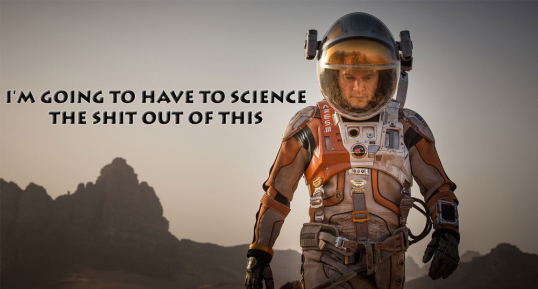Tyson Adams's Blog, page 64
October 8, 2015
Book Review: Moon Called by Patricia Briggs
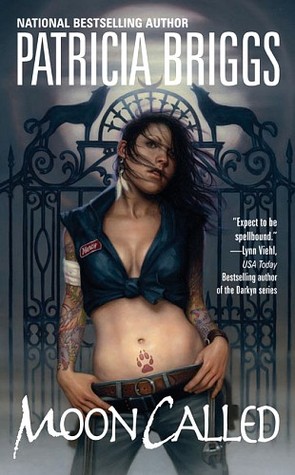 Moon Called by Patricia Briggs
Moon Called by Patricia Briggs
My rating: 4 of 5 stars
Have you ever wondered if werewolves are sexy? Apparently it isn’t just Rule 34 that has the answer on that question.
Moon Called is the first in the highly successful Patricia Briggs series. Mercy Thompson is the local mechanic, a shape shifter, and a lightning rod for trouble. First a runaway with problems starts work at her shop, bringing his problems with him. Then her friendly neighbourhood werewolves get dragged into the start of a civil war. And then it seems the local witches and vampires are involved. Then Cthulhu rises… Okay, I made up the last bit.
Patricia’s Mercy Thompson series are not normally the sort of book I would choose to read. Being a guy, I have these prejudices about sparkly vampires, sexy werewolves, and novels clearly aimed at that market. Which is stupid on my part. The Moon Called has as much in common with Twilight as Anne Rice’s Vampire Chronicles. In other words, I could have enjoyed this series earlier if not for my misplaced prejudice.
This was a fast paced novel that was highly entertaining. One thing that stood out to me, though, was the novel kind of ended without really finishing the story. This made the ending feel a little unsatisfying, but at the same time it felt like a more natural story, especially for a series. I suppose it is refreshing to have a novel unafraid to not have an epilogue or tagged on final chapter that ties up all the loose ends. And this open-endedness doesn’t feel like a deliberate setup for a series, rather it feels like a genuine limited world perspective: we don’t get to know everything because the characters don’t know everything. I will be reading many more Patricia Briggs novels.
Tagged: Anne Rice, Book review, Book reviews, Fae, Mercy Thompson, Moon Called, Patricia Briggs, Reading, Right What You No, Twilight, Twilight sucks, Tyson Adams, Urban fantasy, Vampire Chronicles, Vampires, Werecoyote, Werewolves

October 3, 2015
The continued war on e-books
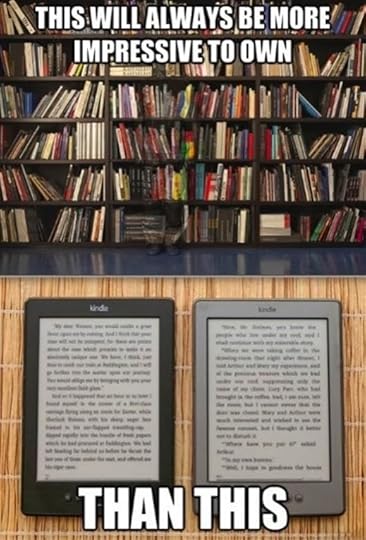
Stupid meme is stupid.
Do you love the smell of books?
Do you prefer the feel of paper?
Do you feel slightly superior to others because you paid for the hardcover?
Do you grasp at any excuse to deride e-books and the people who read them?
Well, I have found the article for you!
Recently on Mental Floss an article entitled “5 Reasons Physical Books Might Be Better Than E-Books” sought to comfort snooty readers who wanted ammunition to fling at e-book readers. In the proud tradition of deriding any new technology as bad (see e-books, e-cars, driverless cars, etc), this article introduces us to some research that is wonderfully out of context for the intent of the article’s argument. Let’s dig in.
Though e-book readers have become a more common sight around town, traditional books still have their evangelists. According to The New York Times, e-book sales have been falling in 2015. Print definitely isn’t dead. In fact, according to some research, it may actually be a better choice for some readers. While scientists are still trying to tease out exactly how digital reading affects us differently, here are five ways e-books might be inferior to their dead-tree cousins.
When deriding things it is always best to reference another article that derides the same thing. In this case the article references the wonderfully misleading NYT piece on e-book sales slipping. Pity that the sales didn’t slip… That’s right, the NYT misrepresented a slowing in e-book sales growth as a drop in sales. And did they mention why readers were stating a preference for paper? Yes. Hidden in the article is a little quote about how publishers had been protecting their paper sales by inflating e-book prices. Now, my economics is a tad rusty, but I’m pretty sure making something more expensive when there are direct substitutes on offer results in a decrease in sales of that item and an increase in the sales of the substitution item. At least, that’s what I’ve heard…
1. E-BOOKS CAN REDUCE READING COMPREHENSION.
In a study of middle schoolers, West Chester University researchers found that students who read on iPads had lower reading comprehension than when they read traditional printed books. They discovered that the kids sometimes skipped text in favor of interactive features in the e-books, suggesting that certain multimedia in children’s e-books can be detrimental to the practice of reading itself. However, the researchers noted that some interactive features in e-books are designed to enhance comprehension, and that those might be more helpful than game-type interactive graphics.
This is a fantastic study in how multitasking is terrible for concentration and thus impacts reading comprehension. iPads have all sorts of cool stuff on them, including little notifications telling you that your friend just liked your latest picture of your meal. And building those distractions into the book being read: sounds like a great idea! What this study doesn’t do is support the idea that e-books reduce reading comprehension.
2. YOUNG KIDS CAN GET DISTRACTED BY E-BOOKS.
Similar results were found by a small study by the Joan Ganz Cooney Center that consisted of 32 kids reading e-books and print books with their parents. It found that “enhanced” e-books might be distracting. Kids who read enhanced e-books—ones with interactive, multimedia experiences—were more engaged with them physically, but in the end they remembered fewer narrative details than those who read print books or basic e-books [PDF].
Don’t read the link. Don’t read the link. You read the link: didn’t you. Leaving aside the tiny study size for a moment (a point the study authors acknowledge), the study itself supports the points I made above about being distracted whilst reading. And if you look through the study you see a great little chart that showed the comparison of reading comprehension – expressed as story details recalled – was actually superior in basic e-books than in print books or enhanced e-books.
The findings of the study were literally stated as:
The enhanced e-book was less effective than the print and basic e-book in supporting the benefits of co-reading because it prompted more non-content related interactions.
Odd that the “e-books are bad” article failed to highlight this finding…
3. YOU REMEMBER LESS ABOUT A BOOK’S TIMELINE.
Another study of adults also found that e-books can be hard to absorb. The researchers asked 25 people read a 28-page story on a Kindle and 25 to read the story in paperback, then asked the readers to put 14 events from the story in chronological order. Those who read the story on a Kindle performed worse on the chronology test than the book readers, though they performed about the same as print readers in other tests. Earlier research by the same scholars, from Stavanger University in Norway, found that Norwegian 10th graders also remembered more about texts if they read them in print rather than on a computer screen [PDF].
Finally we come to a study on actual e-books on an actual e-reader versus their dead tree counterparts. Of course I’m again blown away by the sample size of the study, a massive 50 people. That should easily extrapolate to the rest of humankind. The linked article doesn’t give us much information, but I found a better one, and it has this summary:
In most respects, there was no significant difference between the Kindle readers and the paper readers: the emotional measures were roughly the same, and both groups of readers responded almost equally to questions dealing with the setting of the story, the characters and other plot details. But, the Kindle readers scored significantly lower on questions about when events in the story occurred. They also performed almost twice as poorly when asked to arrange 14 plot points in the correct sequence.
I’d link to the original paper, but it is behind a paywall. Suffice to say that the error margins were pretty big (even the paper readers got 34% of the plot points in the wrong order). And this was a short story, something that shouldn’t be that difficult for any reader. So this probably says as much about the story as anything. They’d need far more stories and participants to get a good idea of what is going on. But I will concede that reading on paper vs e-reader vs screen is definitely a different experience and has an influence. What that influence is, positive, negative, or just different, needs more research.
Interestingly the study of reading PDF texts on a screen vs paper texts in high school students showed why scrolling is a terrible way to read anything. Scroll down to read more about PDFs sucking.
4. THEY’RE NOT GREAT AS TEXTBOOKS.
While e-book textbooks are often cheaper (and easier to carry) than traditional door-stop textbooks, college students often don’t prefer them. In some surveys of college kids, the majority of students have reported preferring print books. However, a 2012 study from the UK’s National Literacy Trust of kids ages 8 to 16 found that more than 50 percent of children reported preferring screen reading [PDF].
It is odd to start a point and then go on to disprove it. E-book textbooks being cheaper, easier to carry, and in some surveys preferred by the majority of respondents, seems to me to be the opposite of “not great”. The preference for paper textbooks claim comes from a survey of 527 students, yet is immediately refuted by the UK survey of 34,910 students. I wonder which one is more representative of how students feel about textbooks?
In the comments of the Mental Floss article, someone made a good point in regard to the format of textbooks. Oftentimes the textbooks are PDFs, which brings us back to the point about scrolling, and adds the problem with taking notes. Clearly the format of the e-book plays a big part in how people feel about them.
5. THEY’RE TIRING.
Staring at a lit screen can be tiring for the eyes and the brain. A 2005 study from Sweden found that reading digitally required a higher cognitive workload than reading on paper. Furthermore, staring at LED screens at night can disrupt sleep patterns. A 2014 Harvard study found that people who used e-readers with LED screens at night slept worse and were more tired the next day. So, if you’re going to go for an e-book, go for one without the backlight.
Now let us talk about how bad e-books are for your brain…. Sorry, did I say e-books when I meant LED screens like your iPad and computer? Silly me. Having bright light, especially from white background screens, shining in your eyes at night isn’t a good thing. But that is about as related to e-books as X-Factor is to talented singers. So the message about changing your screen setup for night viewing only really applies to readers if they utilise a backlit screen for reading.
And now that we are at the end of the article, let’s throw in some information for the pretence of balance in the hopes you will ignore the headline and main article points:
BUT DON’T THROW AWAY YOUR E-READER JUST YET.
However, all this may not mean that reading on a Kindle is really going to melt your brain. For instance, reading an e-book on a computer is a much different experience than reading on a Kindle, which is specifically designed for consuming books. So, too, is playing with an interactive e-book on an iPad, compared to using a simpler e-book device that only presents the text, with no opportunities to click away into digital distractions.
This really does appear to be information that would have been better presented in the context of the “e-books are evil” points above; doesn’t it. Throwing in this sort of context at the end rather than in the discussion of the study findings is a cheap tactic, a ploy that sees important information left until after you have already formed your opinion on a subject, or just plain stopped reading the article. This information has far less chance of being retained than the others points made earlier in the article, thus the article has created the bias they were after (deliberately or otherwise).
And some studies have found that part of the difference between the way people absorb information from e-books versus paper might be due to approaching e-books differently—in one test, participants didn’t regulate their study time with digital books like they did with paper texts, leading to worse performances. It’s possible that our expectations of e-book reading—as well as the different designs of the digital reading experience on a computer or iPad or Kindle—might affect how we approach the text and how much effort we put into studying them. As generations of e-book readers evolve, and people become more accustomed to the idea of sitting down with a digital textbook, these factors could change—for better or for worse.
These are all good points, again made at the end of the article rather than at least being hinted at throughout. And unlike the main points in the article, these are unreferenced. Are these points from the studies already referenced (some are) or some other studies that aren’t worth mentioning? In the former, you would expect these points to have been raised earlier in the article in the proper context, in the latter, this feels like an attempt to downplay the statements as less important than the referenced points above. Either way we are left with the sentiment “change is scary” rather than “change is change”.
Hopefully this breakdown of the Mental Floss article shows just how disingenuous many of these anti-technology articles are, especially the “e-books are evil” articles. I’m not trying to say that e-books are what everyone should be reading, or that our forests are now saved from Dan Brown. There is clear evidence that our changing technology is changing the way we read and absorb information, and this transition period is still a learning phase as to how and if we will change our reading preferences. But negative preconceived ideas about e-books (or technology) don’t help in communicating about the change that is happening.
Tagged: Amazon Kindle, E-books, e-books are evil, E-readers, ebooks, iPad, Kindle, Mental Floss, Mythtaken, PDF, PDFs suck, Right What You No, Technology, Technology change, Tyson Adams

October 1, 2015
Book vs Movie: V For Vendetta – What’s the difference?
In this outing for the CineFix team they have covered the classic graphic novel and movie adaptation of Alan Moore’s V For Vendetta.
So, truth be told, I’m not a huge fan of the Alan Moore graphic novel V For Vendetta – yeah, yeah, I know: sacrilege. I actually gave up on it about a third of the way through, as such it is hard for me to compare the book to the movie. Actually, that’s not true, I can compare how entertained I was, since I enjoyed the movie and couldn’t be bothered finishing the book. That should say a lot.
Moore distancing himself from all adaptations of his work is odd, but completely understandable given it is based upon having watched* The League of Extraordinary Gentlemen movie. That was the film that caused Sean Connery to quit acting, which gives you some idea of just how bad that movie was. But you are still left with his admonishments of adaptations, like V For Vendetta or The Watchmen, that were good films (IMHO) and captured the essence of the source material. Like most of the book to movie adaptations discussed in the What’s the Difference? series, when you see the breakdowns of differences you can completely understand why the changes were made. The example in this video was of Evie’s character arc to help the audience empathise with both her and V in a shorter format. The book and movie occupy different spaces, have different constraints, and are often made at different times for society.
Which is why I find Moore’s stance – or is that complaints – on adaptations of his work to be a bit precious. I mean, he was, and I quote, “getting money for old rope” as well as a much wider exposure as an artist. He has managed to influence popular culture (The Killing Joke was the primary reference material for Heath Ledger’s portrayal of The Joker). Not much to complain about. Unless the movie studios paid him in beard trimmers.
*Being a little flippant here as he was also sued over accusations that someone else’s script was plagiarised.
Tagged: Adaptation, Alan Moore, Book to movie, Book versus Movie, Book vs Movie, CineFix, Graphic novel, Heath Ledger, Movie adaptation, Right What You No, The Killing Joke, The League of Extraordinary Gentlemen, The Watchmen, Tyson Adams, V For Vendetta, What's the difference

September 23, 2015
Book reviews: The King’s Deception by Steve Berry
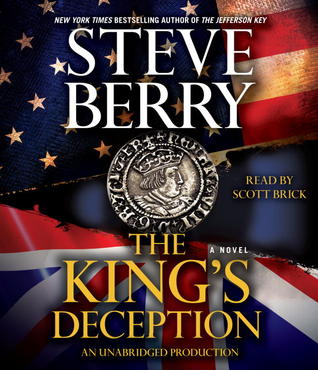 The King’s Deception by Steve Berry
The King’s Deception by Steve Berry
My rating: 3.5 of 5 stars
Have you ever wanted a thriller to star not one, but two book store owners? Well, this is the novel for you!
That’s right, our favourite book seller is back in action. This time Cotton Malone is caught up in a CIA operation called King’s Deception. See what Steve Berry did there? Cotton and his son Gary get caught up with the CIA, SIS – better known as MI6 – and The Dedalus Society’s deadly spy games. King’s Deception is their game and Cotton has to blah blah the McGuffin surrounding Elizabeth the First before the blah blah.
I’m a big fan of Steve Berry’s novels. They are always entertaining and well thought out thrillers. Berry is the writer Dan Brown wishes he was, but then takes a swim in his pool of money to console himself. As is typical with this genre, Berry seamlessly mixes the modern day with the historical McGuffin in a plausible and interesting manner. But for me, I found this to be one of Berry’s weaker novels.
My main fault with the book was that it was a story being recounted between the narrator and reader analogues, with the first and last chapters book ending the actual story. I hate this sort of story telling. It always feels hackneyed, even in films. At least flashbacks only last a short time, this is like having 95% of the story be a flashback. In this case you could cut the first and last chapters out and it would be a perfectly reasonable novel, so the additions of these parts feels superfluous.
Despite that criticism, the book was entertaining and would rank 4 stars, but I’m giving it 3.5 stars. I’m taking half a star off for the book-ends on the actual story.
Tagged: Book review, Book reviews, CIA, Cotton Malone, Dan Brown, Dedalus Society, Historical thriller, McGuffin, MI6, Novels set in London, Reading, Reviews, Right What You No, SIS, Steve Berry, Steven Berry, The King, The King's Deception, Thriller, Tudor England, Tyson Adams

September 20, 2015
Book vs Movie: Psycho – What’s the difference
Another great instalment of CineFix’s What’s the Difference? series. This time it is the famous Hitchcock film Psycho and the novel it was based upon.
Some interesting differences in the storytelling, aren’t there! The most interesting was the way Hitchcock sets up his viewers to empathise with the victim, Mary/Marion, as much as possible, whilst also moving away from the cliché of Norman being a chubby-loser. My highlight from the video is the revelation that the book, and obviously the subsequent movie, were based upon a real murderer. I suppose skin is pretty durable stuff, it would be a shame to just throw it away.
Tagged: Alfred Hitchcock, Book to movie, Book versus Movie, Book vs Movie, CineFix, Classic films, Hitchcock, norman bates, Psycho, Slasher, Slasher film, Thriller, Tyson Adams, What's the difference

September 12, 2015
Common Myths
Found at From Quarks To Quasars.
Original and larger version.
Tagged: Common Misconceptions, From Quarks to Quasars, Information is Beautiful, Knowledge is Beautiful, Myth, Mythtaken, Pics, Right What You No, Tyson Adams

September 2, 2015
Book vs Movie: Alice in Wonderland – What’s the difference?
Another great instalment from the CineFix team. And don’t worry, they didn’t do the Depp/Burton movie comparison. Dodged a bullet there.
I can’t claim to have read all of Alice in Wonderland. I can’t even claim to be much of a fan of the movie; Disney animation or otherwise. My main reason for not liking either is that this is a classic example, and possibly the progenitor, of the “and then she woke up” ending. My wife dislikes the book because it lacks a point and is boring and waffly. Since it is a “classic children’s book” it could explain why kids used to hate reading: thank FSM for Harry Potter!
Tagged: Alice In Wonderland, Alice Through The Looking Glass, Book versus Movie, Book vs film, Book vs Movie, Children's book, CineFix, Classic children's book, Classics, Disney, Harry Potter, Johnny Depp, Kids books, Literary classics, Right What You No, Tim Burton, Tyson Adams, What's the difference

August 27, 2015
Book Review: Fat, Fifty & F***ed by Geoffrey McGeachin
 Fat, Fifty & F***ed!: A Fast & Furious Novel by Geoffrey McGeachin
Fat, Fifty & F***ed!: A Fast & Furious Novel by Geoffrey McGeachin
My rating: 4 of 5 stars
Expletives in the title? Yeah, let’s dash a few letters out, wouldn’t want anyone to realise someone wrote a “naughty” word.
The story follows the adventure of Martin Carter, a bank manager in a small dying town. Martin’s life is a huge disappointment, so instead of buying a sports car he robs his bank and goes on the run. Pursued by a security agency, meeting all sorts of interesting Aussie characters, and trying to find the elusive perfect breakfast, Martin does the midlife crisis in style.
As a long time fan of Geoff McGeachin’s writing, it was a pleasure to pick up one of his humorous novels again, after reading his award winning Black Wattle Creek. Can’t have humour in a book and have it win awards. There are rules. Fat, Fifty and Fucked is Geoff’s first novel and sets the template for his irreverent, humorous, fun, and foodie writing style that his Alby Murdoch novels utilised. I also think Geoff captures the stereotypical Aussie characters and humour in a way that few other authors manage, even if some would find this off-putting, despite how he doesn’t go the full Alf Stewart.
Great yarn: well worth a read.
Tagged: Alby Murdoch, Alf Stewart, Black Wattle Creek, Crime thriller, Fat Fifty and Fucked, Foodie, Geoff McGeachin, Humor, Humour, irreverent writing, Martin Carter, Tyson Adams

August 19, 2015
Book review: The Martian by Andy Weir
 The Martian by Andy Weir
The Martian by Andy Weir
My rating: 5 of 5 stars
Potatoes and Pirate-Ninjas: the reason you will read this book.*
I’m late to the Mark Watney appreciation society, since I only heard about this book as a result of the movie trailer. I guess at least I didn’t find out about the book after watching the movie and wondering if it was based on anything. The blurb essentially sums up the novel “Six days ago, astronaut Mark Watney became one of the first men to walk on the surface of Mars. Now, he’s sure he’ll be the first man to die there.” There you go, premise done.
To say I enjoyed this book is an understatement, as I usually hate novels that try to be hard sci-fi. I mean, if I want to read a physics text book I’ll grab the one on my shelf, not some of the “plausible” made up stuff that hurts my needless exposition aversion gland. So to find a hard sci-fi story that manages to be so entertaining was no small feat. The humour was a big part of the reason for the enjoyment. I felt that this addition was very important to not only the characterisation of Watney the space-nerd – because nerds are normally only funny to laugh at – but also in how too many novels would have taken the same premise far too seriously.
So now I’m looking forward to the movie. This should adapt very well to the big screen, and Matt Damon seems like a great choice for Watney. Hopefully Ridley Scott won’t go all Prometheus with The Martian and we’ll have a great adaptation.
* Because you’ll wonder what the hell those things could possibly have to do with a book about Mars.
Tagged: Adaptation, Andy Weir, Book adaptation, Hard Sci-fi, I'm going to have to science the shit out of this, Mark Watney, Mark Watney appreciation society, Mars, Matt Damon, Movie, Pirate-ninjas, Potatoes, Prometheus sucked, Ridley Scott, Right What You No, Sci-fi, Sci-fi thriller, Space, The Martian, Tyson Adams

August 6, 2015
Fastest Ships Ever Created
Below is a wonderful infographic that compares a selection of the fastest ships ever created. Very cool.

The Fastest Ship in the Universe : How Sci-Fi Ships Stack Up Created by: FatWallet.com
Worth heading over to the original page for the discussion section. Highlights include which ships were missing, and a better estimate of the Heart of Gold’s top speed.
Tagged: Apollo 11, Cylon Raider, Daedalus, Death Star, Delorean, Discovery One, Fastest ship, Fat Wallet, Fireball XL5, Galactica, Heart of Gold, Jupiter 2, Millenium falcon, Moya, Pillar of Autumn, Planet Express, Project Orion, Red Dwarf, Right What You No, Samus' Gunship, Saturn V, Sci-fi, science fiction, Serenity, Slave 1, Space Shuttle Discovery, Space travel, Spaceball 1, Stardrive, Starship, Swordfish II, Tardis, The Ark, The Event Horizon, The Gunstar, The Roger Young, Thunderbird 3, Thunderfighter, TIE Fighter, Tyson Adams, USCSS Nostromo, USCSS Prometheus, USS Enterprise, USS Sulaco, USS Voyager, Voyager 1, Warp Drive, X-Wing


